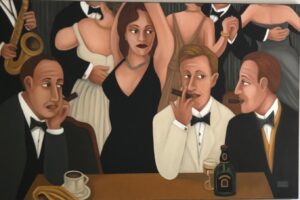Last month, I went to my cousin’s house to celebrate our nation’s birthday. Our mothers are sisters who came to the United States from Nazi Germany as unaccompanied minors, a year apart, via a little-known American program, The One Thousand Children. Aunt Betty married another Holocaust refugee, Uncle Walter, who brought us his own amazing family story.
When I entered my cousin’s living room, he pointed out an eye-popping painting that hangs behind his couch. The large, gaudy canvas features three cigar-chomping men who might have been playing cards at a party.
I looked at my cousin and grinned. I knew immediately why this garish painting held a place of prominence and honor in his home. It pays homage to a family legend: the night of incredible luck
that saved Walter’s father’s life – my cousin’s grandfather.
In 1938, 17-year-old Walter managed to escape Germany with a family heirloom – a precious pocket watch – tucked away in his vest. Walter rode a motorcycle from his small town in southern Germany – then known as Stein am Kocher, now called Neunstadt — to the Rhein River, which formed the border between France and Germany. When he arrived, he dumped the motorcycle in the river. Nazi machine-gun bullets buzzed him and two other men as they dove into the water and tried to swim the quarter mile to the French border. Only two swimmers made it to the other side. It was the first step of many in Walter’s successful effort to reach America.
Meanwhile, Walter’s father, Abraham, had been taken to a few concentration camps. Months passed, and by 1940, Germany needed American dollars to continue funding its war effort. Uncle Walter, now settled in America, approached the German Consulate in Chicago. He offered cash for his father’s release – money he had raised by hocking the valuable pocket watch at a local pawnshop.
When Abraham was released from Dachau, he had a number tattooed on his arm from Auschwitz, and beatings had cost him some of his hearing. Still, the first thing he did when he got out was find a card game in Luxembourg. A successful cattle dealer, Abraham always became so absorbed at the card table that he couldn’t think about anything else – not even a compelling business deal.
A game called Skat, a cross between Pinochle and Gin, was Abraham’s pleasure that night. Deeply engrossed, he lost track of time, never even thinking to look at his pocket watch. In fact, he played so long into the night that he missed the train from Luxembourg to a faraway dock where he was supposed to board a ship to America.
The ship sailed without Abraham. Nazis torpedoed the ship. No one survived.
When Walter learned of the ship’s disaster, he said kaddish, the Jewish prayer for the dead, for his father. Weeks later, Abraham traveled safely to America on another ship, and shocked Walter by coming back from the dead. Walter, for his part, had managed to retrieve the family heirloom from the pawnshop. After father and son were reunited, they found lots of compatible card players and learned many new games.
Aunt Betty often grew impatient with Walter’s endless poker nights. When she begged him to set down the cards and stop playing, Uncle Walter always justified his vice with the same words: “I’m not quitting now. Cards saved my father’s life, and — well, you just never know!”

